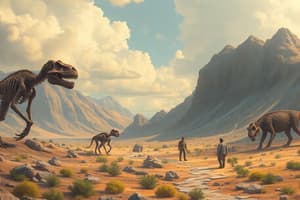Podcast
Questions and Answers
Which of the following eons is part of the geologic time scale?
Which of the following eons is part of the geologic time scale?
- Mesozoic
- Phanerozoic (correct)
- Paleozoic
- All of the above
The tailbone in humans is considered a vestigial structure.
The tailbone in humans is considered a vestigial structure.
True (A)
What is the primary difference between absolute dating and relative dating of fossils?
What is the primary difference between absolute dating and relative dating of fossils?
Relative dating relies on fossil layers, while absolute dating uses radioactive isotopes.
Life on Earth began as a single-celled organism about _____ million years ago.
Life on Earth began as a single-celled organism about _____ million years ago.
What conclusion did Darwin reach after observing variations in finch beaks?
What conclusion did Darwin reach after observing variations in finch beaks?
Artificial selection occurs when humans intervene in the breeding process.
Artificial selection occurs when humans intervene in the breeding process.
What is reproductive fitness?
What is reproductive fitness?
Match the following evolutionary concepts with their descriptions:
Match the following evolutionary concepts with their descriptions:
Flashcards
Pangea's breakup
Pangea's breakup
The splitting of the supercontinent Pangea into smaller continents over millions of years, due to plate tectonics.
Phanerozoic eon
Phanerozoic eon
An eon in the geologic time scale, encompassing the most recent part of Earth's history, marked by the appearance of abundant life forms.
Absolute dating
Absolute dating
A method of determining the exact age of a fossil or rock using radioactive isotopes.
Relative dating
Relative dating
Signup and view all the flashcards
Darwin's finches
Darwin's finches
Signup and view all the flashcards
Bacteria in Evolution
Bacteria in Evolution
Signup and view all the flashcards
Reproductive fitness
Reproductive fitness
Signup and view all the flashcards
Vestigial structure
Vestigial structure
Signup and view all the flashcards
Study Notes
Earth's History
- Pangea's formation and breakup supported by evidence from matching coastlines, fossils, and rock formations.
- Phanerozoic is an eon in the geologic time scale.
- Absolute dating uses radioactive isotopes; relative dating relies on fossil layers.
- Geologic time is a timeline of significant evolutionary events in Earth's history.
- Life on Earth began as a single-celled organism approximately 3,800 million years ago (mya).
Theory of Evolution by Natural Selection
- Darwin observed variations in finch beak shapes on different Galapagos Islands; this suggested adaptation to differing food sources.
- Bacteria are useful in evolution studies due to their rapid mutation and reproduction rates.
- The tail bone is a vestigial structure in humans.
- Darwin's voyage on the HMS Beagle explored South American coastlines.
- Darwin's observations included variations in finch beaks.
- Darwin concluded species adapt to their environments through natural selection.
Science 8 Evolution Unit Test
- Reproductive fitness is the ability to survive and reproduce successfully in an environment.
- Artificial selection is an example where humans select traits. (Wolves developing thicker fur in cold climates is NOT artificial selection, but natural selection).
- Kin selection increases survival chances of relatives.
- Microevolution occurs due to mutations creating new allele variations.
- Macroevolution begins with population isolation.
- Macroevolution examples include the appearance of mammals after dinosaur extinction.
- Homologous structures suggest shared evolutionary ancestry between species.
Studying That Suits You
Use AI to generate personalized quizzes and flashcards to suit your learning preferences.




